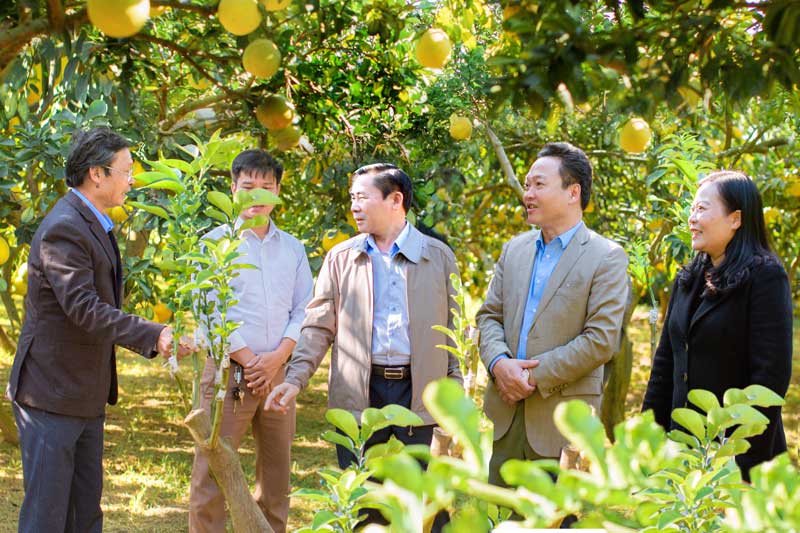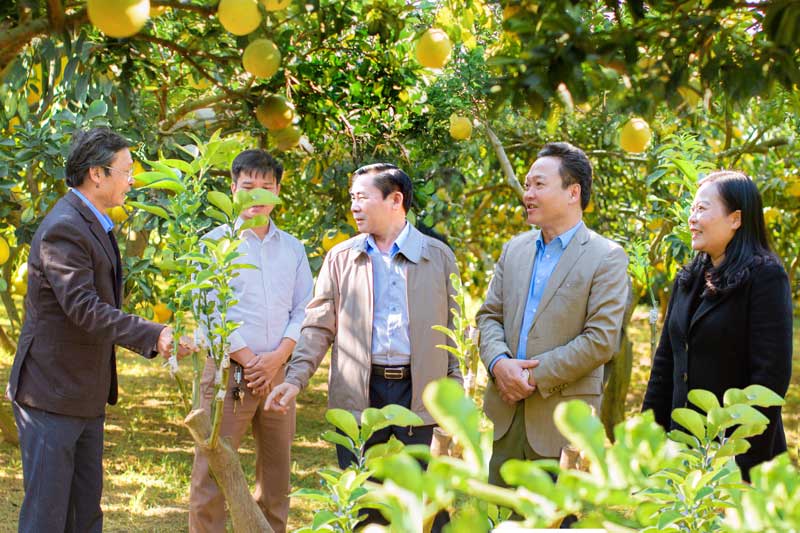
(HBO) – In recent years, citrus fruit has gradually affirmed its position in the agricultural production of Yen Thuy district in the northern province of Hoa Binh, contributing to the goal of restructuring agriculture in association with building new-style rural areas. To reap the outcome, local authorities have concretised documents in leadership and direction in the locality.
 Leaders from the Yen Thuy People’s Committee encourage
organisations and individuals to effectively apply technical advances in
developing clean agricultural products, especially grapefruit in the area.
Leaders from the Yen Thuy People’s Committee encourage
organisations and individuals to effectively apply technical advances in
developing clean agricultural products, especially grapefruit in the area.
The district has gradually formed and developed
specialised areas for growing grapefruit in Ngoc Luong, Bao Hieu, Yen Tri, Doan
Ket, and Yen Lac communes, and Hang Tram township.
As of November 2019, the district has 610.5
hectares of grapefruit, including 250.97 hectares for harvesting. It is
expected that the grapefruit area will increase to 851 hectares by 2020 with an
output of over 10,000 tonnes.
Yen Thuy grapefruit is well-known in and out of
the district. However, the product has not yet had a brand and an
identification system (QRcod), so the value is still low, and the consumer
market remains limited, mostly depending on traders.
Given the fact, the district’s People’s
Committee coordinated with the Center for Agraian Systems Research and
Development (CASRAD) to implement a project building, managing and developing
brand for Yen Thuy grapefruit.
The National Office of Intellectual Property
under the Ministry of Science and Technology has issued trademark certification
for "Yen Thuy grapefruit” at Decision No.76495/QD-SHTT dated on September 9,
2019.
The brand is important to help grapefruit and
other farm produce of the district reach more organisations, individuals,
businesses, and customers inside and outside the province.
The district will promote trade and connect
markets to help increase the presence of this citrus fruit in supermarkets and
trade centres in Hanoi, and look towards exports.
Local authorities affirmed to continue
connecting with investors to expand market for Yen Thuy’s clean farm produce./.
According to data from the Hoa Binh Provincial Party Committee, the industrial production index for the first six months of 2025 is estimated to have increased by 20% compared to the same period last year. This marks the highest year-on-year growth rate for this period since 2020.
In the first six months of 2025, Hoa Binh province’s export turnover was estimated at 1.145 billion USD, marking an 18.11% increase compared to the same period in 2024. Import turnover was estimated at $ 804 million, a 17.15% increase, which helped the province maintain a positive trade balance.
The lives of the ethnic minority farmers in Tan Lac district have gradually improved thanks to the new directions in agricultural production. This is a testament to the collective strength fostered through the professional associations and groups implemented by various levels of the district’s Farmers’ Union.
With the motto the "product quality comes first,” after nearly one year of establishment and operation, Muong village’s Clean Food Agricultural and Commercial Cooperative, located in Cau Hamlet, Hung Son Commune (Kim Boi district), has launched reputable, high-quality agricultural products to the market that are well-received by consumers. The products such as Muong village’s pork sausage, salt-cured chicken, and salt-cured pork hocks have gradually carved out a place in the market and they are on the path to obtaining the OCOP certification.
In the past, the phrase "bumper harvest, rock-bottom prices" was a familiar refrain for Vietnamese farmers engaged in fragmented, small-scale agriculture. But today, a new spirit is emerging across rural areas of Hoa Binh province - one of collaboration, organisation, and collective economic models that provide a stable foundation for production.
Maintaining growing area codes and packing facility codes in accordance with regulations is a mandatory requirement for agricultural products to be eligible for export. Recently, the Department of Agriculture and Environment of Hoa Binh province has intensified technical supervision of designated farming areas and packing facilities to safeguard the "green passport" that enables its products to access international markets.



 Leaders from the Yen Thuy People’s Committee encourage
organisations and individuals to effectively apply technical advances in
developing clean agricultural products, especially grapefruit in the area.
Leaders from the Yen Thuy People’s Committee encourage
organisations and individuals to effectively apply technical advances in
developing clean agricultural products, especially grapefruit in the area.